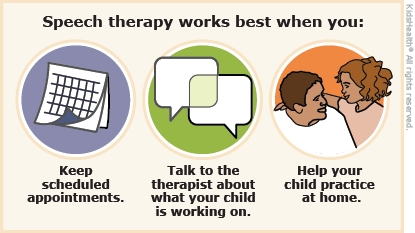Speech is what you say and how you say it. Language is giving and getting information through what is said, heard, written, and used in body language. If a child isn't developing speech and language skills at the rate expected for their age, a speech therapist (also called a speech and language pathologist, or SLP) can help.
Recognizing and treating speech and language delays early is the best way to help your child. With time and therapy, many speech and language delays get better.


Keep scheduled visits. Treatment usually includes regular visits with the speech therapist and activities to do at home or in school. The speech therapist might work with your child one-on-one or in a small group. Sometimes the therapist may recommend that a child get other types of services at school.
Talk to the therapist about what your child is working on. Speech therapists use a variety of strategies, such as:
Help your child practice at home. The exercises your speech therapist gives you to practice at home are an important part of helping your child's speech and language develop. Be sure you understand any instructions and do the exercises as instructed.
Be patient with your child. Overcoming a speech or language disorder can take time and effort. So all family members should be patient and understanding with the child.

You have:

What is the difference between speech and language delays? Speech and language problems differ, but often overlap. A child with a speech delay might use words and phrases in the right way but be hard to understand. A child with a language delay might say words well but not be able to put them together as expected for their age.
What causes speech or language delays? Kids can have a speech or language delay for many reasons, such as: